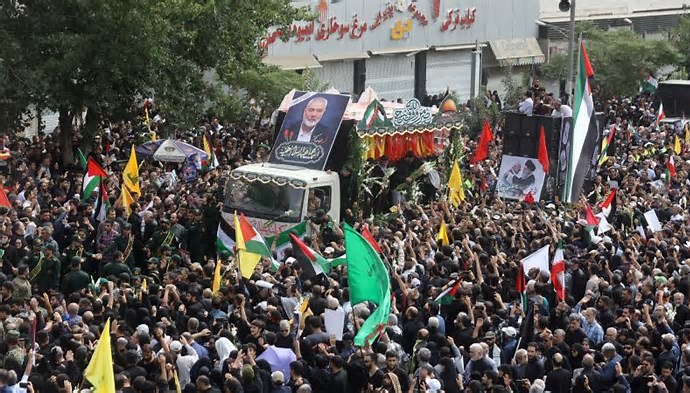Iran has pledged to retaliate for the assassination of Hamas political leader Ismail Haniyeh in Tehran, but officials indicate that the response may be delayed. Ali Mohammad Naeini, a spokesperson for Iran’s Islamic Revolutionary Guard Corps (IRGC), stated on Tuesday that Iran’s response could take time, suggesting a more measured approach. “Time is on our side, and the waiting period for this response may be prolonged,” Naeini said, according to state media.
Former IRGC commander Mohsen Rezaee echoed this sentiment in an interview with CNN, emphasizing that Iran’s actions will be “very calculated.” The Middle East has remained tense since last month’s killing of Haniyeh in Tehran, which occurred just a day after Hezbollah commander Fu’ad Shukr was killed in an airstrike in Beirut. While Israel claimed responsibility for Shukr’s death, it has neither confirmed nor denied involvement in Haniyeh’s assassination. Sources have suggested that Haniyeh was killed by an explosive device hidden in the guest house where he was staying.
Iran, along with its allies Hezbollah and Hamas, has blamed Israel for both killings and vowed retaliation, leading to intense diplomatic efforts to prevent the escalation into a broader regional conflict. Iranian Supreme Leader Ali Khamenei condemned Israel, stating, “You have killed our dear guest in our house and now have paved the way for your harsh punishment.” Hezbollah has also promised a response to Shukr’s killing, calling it “inevitable.”
However, Naeini’s recent comments suggest a shift in tone, indicating that Iran may not resort to immediate or hasty action. “The Zionists must live in instability, and Iran’s response may not be a repeat of past operations,” Naeini said, hinting that the retaliation could take a different form from previous actions.
In a historical context, Iran launched its first-ever direct attack on Israel in April, firing 300 projectiles in response to an Israeli strike on an Iranian diplomatic building in Damascus, which resulted in the death of a top IRGC commander. This time, however, Naeini suggested that Iran’s leadership is carefully considering its options, with the goal of delivering an effective and impactful response.
The tension between Iran and Israel has been exacerbated by the ongoing war in Gaza, which has now lasted over 10 months. Naeini claimed that Israel has “accepted defeat,” citing acknowledgment by American politicians, and criticized the prolonged conflict, which has failed to achieve its objectives of defeating Hamas and securing the release of hostages taken by the group on October 7.
Diplomatic efforts to broker a ceasefire between Israel and Hamas have intensified following the killings of Shukr and Haniyeh. In a statement to CNN, Rezaee emphasized the need for a ceasefire in Gaza and warned against further escalation. “The United States and Israel should not repeat their mistakes. The more this war extends, the more the United States will be damaged,” he said.
Rezaee also reiterated that Iran’s response to Israel will be carefully planned. “We have investigated the possible repercussions. And we will not let Netanyahu, who is sinking in a swamp, save himself. The Iranian actions will be very calculated ones,” he added.
While there have been hints that Iran might reconsider its retaliatory plans if a ceasefire is achieved, Iranian officials have maintained that their response is “totally unrelated to the Gaza ceasefire.” Some analysts speculate that Iran may be hesitant to act, fearing that retaliation could trigger a wider conflict. However, Iran’s leadership has not yet provided a clear indication of when or how it will respond to the killing of Haniyeh.



